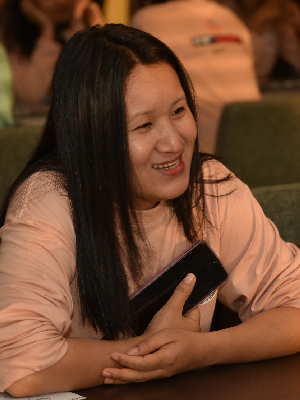After SAR100 I am like a new version of myself – an updated version! The course has taught me more about time management, leadership, empowerment, and breaking the glass ceiling."
Those are the words of Pelchuk Dema, an engineer from the small Kingdom of Bhutan. Penned at the close of her SAR100 course experience in Bangkok, you can almost hear the smile (and confidence) in her voice.
From 2023-2024, Pelchuk completed the 8-month WePOWER SAR-10 course alongside 100 other impressive South Asian female engineers from across Bangladesh, Bhutan, India, Maldives, Nepal, Pakistan and Sri Lanka.
Delivered by the Bangkok-based Asian Institute of Technology (AIT), the course was made possible through the AU $32 million South Asia Regional Infrastructure Connectivity (SARIC) Program, which is funded by the Australian Government and implemented by Palladium alongside the World Bank and the International Finance Corporation.
"The SAR100 training program, which was eight months in duration, was hectic and challenging, yet rewarding for me," says Pelchuk. "Before this program I was not aware of integrated renewable energy and the energy transition happening in South Asia. I also wasn’t aware of the power of networking and team work!"
Renewable energy is of special interest to the experienced Bhutanese engineer. Back home in Bhutan, hydropower is used in abundance – so much so that in 2021, the small Kingdom released its own Sustainable Hydropower Development Policy. The renewable energy source has become the main driver and backbone of Bhutan’s national economy, with even the most remote parts of the country able to access clean, reliable and affordable electricity. Over the past four decades, much effort has gone into grid expansion and the promotion of small, medium and large industries associated with hydropower growth. Not only that, hydropower export revenues are helping Bhutan to meet much of its recurrent and capital expenditures.
As Bhutan continues to accelerate its hydropower agenda, the opportunities for engineers like Pelchuk are growing too. As Pelchuk explains, the knowledge and skills gained from SAR100 are the perfect compliment to her work back home with Druk Green Power Corporation Limited, a company that develops and manages Bhutan’s hydropower resources and assets. In fact, she’s inspired to think even bigger, and be part of South Asia’s regional energy transition.
"The SAR100 program honed my knowledge and skills in integrating renewable energy and smart grid technologies, helping me better understand how they can lead to an efficient, reliable and clean energy future. As the energy transition starts to take place in South Asia, I believe we women are important – we must be empowered to help lead in the sector."
Technical skills weren’t the only thing Pelchuk gained through SAR100 – she also came away with friendships and connections she’ll keep for a lifetime.
"Due to this program, I feel privileged to have established networks and links with high profile female engineers and academics across South Asia," she says. "I will share and advocate using the knowledge I gained, creating a ripple effect on South Asia’s sustainable energy transition."
As she concludes sharing her SAR100 reflections, Pelchuk also makes sure to highlight the importance of family support – something many of our participants are grateful for.
"My husband supported me throughout this program – he is the backbone of our family and credit goes to him as well! I had to sacrifice family time and submit assignments and quizzes, often staying late at night without hampering my regular official office work."
As she returns home to Bhutan, for Pelchuk, the sky is the limit.

